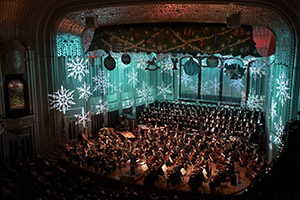by Daniel Hathaway

After the house lights dimmed to black, Severance Hall was suddenly washed in blue light for Mormon Tabernacle Choir director Mack Wilberg’s flashy arrangement of O Come, All Ye Faithful. What followed was completely different: William Walton’s 1940 orchestral “arrangement” — fascinating recomposition might be a better term — of J.S. Bach’s “Sheep May Safely Graze,” an aria from the Hunting Cantata BWV 208. The original is for two recorders, soprano solo, and continuo while Walton’s is a fantasy for large orchestra with extensive violin and oboe solos (Jung-Min Amy Lee and Frank Rosenwein).
Christmas returned with Barlow Bradford’s extravagant arrangement of The Sussex Carol (“On Christmas Night…”) with the obligatory modulation up a third for the last verse. More in tune with traditional Christmas sensibilities were Healey Willan and Robert Triplett’s setting of the French carol What Is This Lovely Fragrance?, Robert Sieving’s arrangement of Kling, Glöckchen, Kling!, and Shaw & Bennett’s version of Deck the Hall.
The Cleveland Orchestra Chorus had an a cappella moment with Eric Whitacre’s atmospheric motet Lux Aurumque, graced by a fine soprano solo by chorus member Miranda Sholl. A Sing-Along of Joy to the World (attractively arranged by John Rutter) led to a rather square performance of one of the waltzes from Tchaikovsky’s Eugene Onegin.
The first half ended with Handel’s “Hallelujah” chorus from Messiah which, as is customary, brought the audience to its feet. In a program so full of arrangements, one had to wonder why Porco didn’t choose Mozart’s reorchestration of the piece. It’s not politically correct, but it adds flutes, clarinets, horns, and trombones to Handel’s oboes, trumpets, timpani, and strings, and would have made a glorious splash at that point in the program.
The second part of the concert belonged to Hollywood, including John Williams’s “Star of Bethlehem” from Home Alone, Alan Silvestri’s “God Bless us, Every One” from Disney’s A Christmas Carol, Howard Blake’s “Walking in the Air” from the 28-minute, 1978 film The Snowman, Leroy Anderson’s Sleigh Ride, and Irving Berlin’s White Christmas.
In between came a traditional audience-participation piece, The Twelve Days of Christmas, which involved members of the audience in variously successful solo attempts at singing “five gold rings,” with funny feedback from the podium, and a visit from Santa which featured witty repartee between Porco and Mr. Claus at the expense of the Cleveland Browns.
Encores were expected, and Porco had at the ready Carmen Dragon’s arrangement of Silent Night and a shortened version of We Wish You a Merry Christmas, bringing the evening to a festive conclusion.
Published on ClevelandClassical.com December 22, 2015.
Click here for a printable copy of this article


